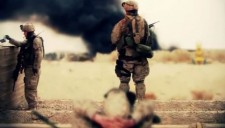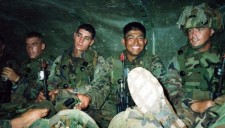His name is Anderson, Garrett Anderson, an ex-marine turned filmmaker whose unit carried pocket digital cameras into some of the worst fighting in Iraq. Anderson is using that footage and post-war interviews to open viewers’ eyes about combat. And to help himself deal with the lasting emotional impact of the terror and pain of war.

One marine, who is Mexican, is so badly hurt he filmed himself giving himself the last rites so his family would have a record of it. He just pulled out his digital camera and hit the record button.
This is real, not just a video game.
Anderson, a marine veteran from Oregon who carried his personal digital camera with him throughout the Iraq war, is making a documentary he hopes will not only open viewers’ eyes about combat. The film shall help him and his fellow fighters find closure. And there’s more to it:
Twelve men fought together, and not one of them experienced the same. Anderson film will show different angles and perspectives. His film’s concept is a kind of modern-day — please allow the comparison — Rashômon, Akira Kurosawa’s brilliant exploration of truth and human weakness — and that nothing really is what it seems to be.
Says Anderson:
I want the audience to examine one day of battle, and follow its subsequent effects through the lives of twelve different people, who now share its trauma.
“And Then They Came Home” is a Kickstarter project that successfully raised its funding goal.
The film is about one day, November 22, 2004; that one day in Fallujah a member of Anderson’s platoon was killed and six others wounded.
That day would have gone forgotten long ago in the oblivion of ever new tragedies if Anderson and most of his fellow marines hadn’t had their own cameras cameras from their private lives with them — and if they hadn’t filmed things as they happened as they fought building to building, searching for snipers.
That’s power of today’s small digital pocket cameras. They’re so inconspicuous and unobtrusive that Anderson’s commanders never said anything about it or tried to stop them.
The footage from those small cameras shows the whole battle documented from the perspective of the guys who fought it — young men who then came home and found out that whether you are physically wounded or not, sometimes the mental effects can be so much worse.
Several of Anderson’s fellow marines suffered severe bouts of post-traumatic stress disorder, some attempting suicide.
Within weeks of his return home, Anderson found himself physically there, but mentally still in Iraq:
It was problem drinking every hight really bad. I’d sit down and I’d watch YouTube videos of Iraq blowing up and stuff. All night. I couldn’t go to bed and the insomnia became a problem.
Following a mental breakdown he ended up in hospital.

With the hours and hours of footage viewers are getting first person point-of-view from a guy who’s on the ground sometimes in a firefight.
Anderson and his platoon have experienced the war first hand. The material shows some of the most brutal and realistic footage ever shot in combat.
His film is not a commercial venture. It’s an attempt to explain and understand. “This documentary is going to be a healing process for me”, says Anderson.
By means of the power of the image, with reams of war footage and 12 engrossing stories to tell.
Anderson’s not new to digital media. He’s done film commercials for small local television stations. “And Then They Came Home” is his first documentary.
On a $30,000 shoestring budget.
Made possible by the digital imaging revolution, he says, that gives the artist the opportunity to bypass a lot of the old ways.
Anderson hopes to have the film finished this fall.
Based on reporting by the Associated Press.


